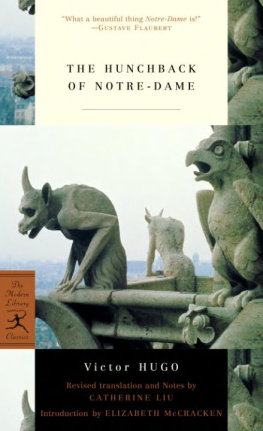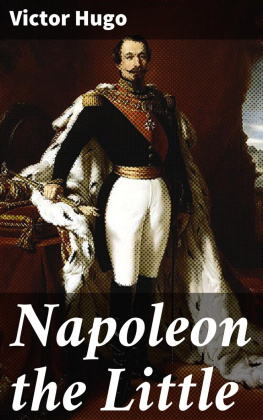AT RHEIMS. 18231838.
It was at Rheims that I heard the name of Shakespeare for the first time. It was pronounced by Charles Nodier. That was in 1825, during the coronation of Charles X.
No one at that time spoke of Shakespeare quite seriously. Voltaire's ridicule of him was law. Mme. de Stal had adopted Germany, the great land of Kant, of Schiller, and of Beethoven. Ducis was at the height of his triumph; he and Delille were seated side by side in academic glory, which is not unlike theatrical glory. Ducis had succeeded in doing something with Shakespeare; he had made him possible; he had extracted some "tragedies" from him; Ducis impressed one as being a man who could chisel an Apollo out of Moloch. It was the time when Iago was called Pezare; Horatio, Norceste; and Desdemona, Hedelmone. A charming and very witty woman, the Duchess de Duras, used to say: "Desdemona, what an ugly name! Fie!" Talma, Prince of Denmark, in a tunic of lilac satin trimmed with fur, used to exclaim: "Avaunt! Dread spectre!" The poor spectre, in fact, was only tolerated behind the scenes. If it had ventured to put in the slightest appearance M. Evariste Dumoulin would have given it a severe talking to. Some Gnin or other would have hurled at it the first cobblestone he could lay his hand ona line from Boileau: L'esprit n'est point mu de ce qu'il ne croit pas. It was replaced on the stage by an "urn" that Talma carried under his arm. A spectre is ridiculous; "ashes," that's the style! Are not the "ashes" of Napoleon still spoken of? Is not the translation of the coffin from St. Helena to the Invalides alluded to as "the return of the ashes"? As to the witches of Macbeth, they were rigorously barred. The hallporter of the ThtreFranais had his orders. They would have been received with their own brooms.
I am mistaken, however, in saying that I did not know Shakespeare. I knew him as everybody else did, not having read him, and having treated him with ridicule. My childhood began, as everybody's childhood begins, with prejudices. Man finds prejudices beside his cradle, puts them from him a little in the course of his career, and often, alas! takes to them again in his old age.
During this journey in 1825 Charles Nodier and I passed our time recounting to each other the Gothic tales and romances that have taken root in Rheims. Our memories and sometimes our imaginations, clubbed together. Each of us furnished his legend. Rheims is one of the most impossible towns in the geography of story. Pagan lords have lived there, one of whom gave as a dower to his daughter the strips of land in Borysthenes called the "racecourses of Achilles." The Duke de Guyenne, in the fabliaux, passes through Rheims on his way to besiege Babylon; Babylon, moreover, which is very worthy of Rheims, is the capital of the Admiral Gaudissius. It is at Rheims that the deputation sent by the Locri Ozolae to Apollonius of Tyana, "high priest of Bellona,""disembarks." While discussing this disembarkation we argued concerning the Locri Ozolae. These people, according to Nodier, were called the Fetidae because they were half monkeys; according to myself, because they inhabited the marshes of Phocis. We reconstructed on the spot the tradition of St. Remigius and his adventures with the fairy Mazelane. The Champagne country is rich in tales. Nearly all the old Gaulish fables had their origin in this province. Rheims is the land of chimeras. It is perhaps for this reason that kings were crowned there.
Legends are so natural to this place, are in such good soil, that they immediately began to germinate upon the coronation of Charles X. itself. The Duke of Northumberland, the representative of England at the coronation ceremonies, was reputed fabulously wealthy. Wealthy and English, how could he be otherwise than a la mode? The English, at that period, were very popular in French society, although not among the people. They were liked in certain salons because of Waterloo, which was still fairly recent, and to Anglicize the French language was a recommendation in ultrafashionable society. Lord Northumberland, therefore, long before his arrival, was popular and legendary in Rheims. A coronation was a godsend to Rheims. A flood of opulent people inundated the city. It was the Nile that was passing. Landlords rubbed their hands with glee.
There was in Rheims in those days, and there probably is today, at the corner of a street giving on to the square, a rather large house with a carriageentrance and a balcony, built of stone in the royal style of Louis XIV., and facing the cathedral. About this house and Lord Northumberland the following was related:
In January, 1825, the balcony of the house bore the notice: "House for Sale." All at once the "Moniteur" announced that the coronation of Charles X. would take place at Rheims in the spring. There was great rejoicing in the city. Notices of rooms to let were immediately hung out everywhere. The meanest room was to bring in at least sixty francs a day. One morning a man of irreproachable appearance, dressed in black, with a white cravat, an Englishman who spoke broken French, presented himself at the house in the square. He saw the proprietor, who eyed him attentively.
"You wish to sell your house?" queried the Englishman.
"How much?"
"Ten thousand francs."
"But I don't want to buy it."
"What do you want, then?"
"Only to hire it."
"That's different. For a year?"
"For six months?"
"No. I want to hire it for three days."
"How much will you charge?"
"Thirty thousand francs."
The gentleman was Lord Northumberland's steward, who was looking for a lodging for his master for the coronation ceremonies. The proprietor had smelled the Englishman and guessed the steward. The house was satisfactory, and the proprietor held out for his price; the Englishman, being only a Norman, gave way to the Champenois; the duke paid the 30,000 francs, and spent three days in the house, at the rate of 400 francs an hour.
Nodier and I were two explorers. When we travelled together, as we occasionally did, we went on voyages of discovery, he in search of rare books, I in search of ruins. He would go into ecstasies over a Cymbalum Mound with margins, and I over a defaced portal. We had given each other a devil. He said to me: "You are possessed of the demon Ogive.""And you," I answered, "of the demon Elzevir."
At Soissons, while I was exploring Saint JeandesVignes, he had discovered, in a suburb, a ragpicker. The ragpicker's basket is the hyphen between rags and paper, and the ragpicker is the hyphen between the beggar and the philosopher. Nodier who gave to the poor, and sometimes to philosophers, had entered the ragpicker's abode. The ragpicker turned out to be a book dealer. Among the books Nodier noticed a rather thick volume of six or eight hundred pages, printed in Spanish, two columns to a page, badly damaged by worms, and the binding missing from the back. The ragpicker, asked what he wanted for it, replied, trembling lest the price should be refused: "Five francs," which Nodier paid, also trembling, but with joy. This book was the Romancero complete. There are only three complete copies of this edition now in existence. One of these a few years ago sold for 7,500 francs. Moreover, worms are vying with each other in eating up these three remaining copies. The peoples, feeders of princes, have something else to do than spend their money to preserve for new editions the legacies of human intellect, and the Romancero, being merely an Iliad, has not been reprinted.
During the three days of the coronation there were great crowds in the streets of Rheims, at the Archbishop's palace, and on the promenades along the Vesdre, eager to catch a glimpse of Charles X. I said to Charles Nodier: "Let us go and see his majesty the cathedral."








